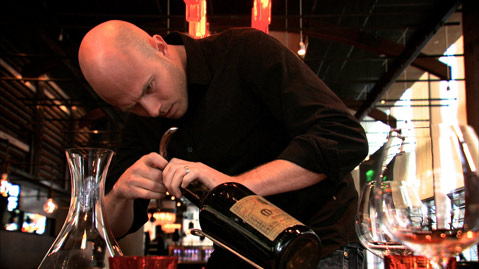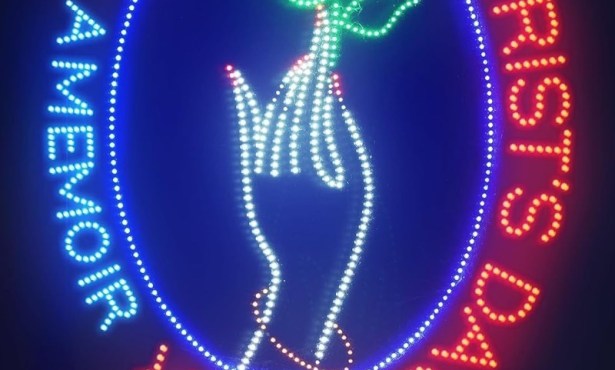Somm
An Interview with Directors Jason Wise and Brian McClintic

The world’s gone more mad for wine in recent years than ever before, with a healthy chunk of today’s population even able to pronounce “sommelier,” the French word for highly trained wine experts who tend to work in high-end restaurants. The epitome of the pro wino track is to become a “Master Sommelier,” an honor bestowed only upon those who can pass a notoriously rigorous annual exam that combines the history, geography, and culture of wine with tasting, pairing, service, and more.
Giving us an in-depth, engaging, and entertaining look at that process is the new documentary Somm, which follows four Master Somm hopefuls as they train and stress their way toward the test. The film premieres in town this week as part of the Santa Barbara International Film Festival, so director Jason Wise and one of the hopeful somms, Brian McClintic — who is also working on opening Caveau, a forthcoming wine shop and tasting bar in the Funk Zone — recently answered a few of my questions via email.
Somm‘s release is very well timed, and really captures the wine world’s popular explosion at the perfect point.
Jason Wise: We are truly hoping the movie has a chance to show people who may be wine drinkers how deep the world really goes — plus, we hope to give people a few laughs. Our goal when this film finally gets out there and finds an audience is that people ask to see the somm when they go out to eat. It is so rare for a film to have a real world impact and that would be the biggest honor. I think most people really want to drink wine they like, not just expensive bottles, but special unique stuff and there is no one better than a sommelier for that. It is also time for people to see sommeliers who are normal guys and girls, not this stuck up image people seem to have when they think of the profession.
As for the timing, it was a little of both. We filmed for several years to get the right story and make our subjects comfortable with the idea of this movie — the whole time we had this feeling that if we did this right it could be incredible. There was just a feeling in the air that we may have lightning in a bottle with this. I still can’t believe no one made this movie before me.
How long did it take to make the film, and how did you stumble upon it?
JW: We filmed for just about three years with a few breaks that were filled with mostly editing. For the majority of production, the crew consisted of me and one other person, my cinematographer Jackson Myers. I have been making money as a bartender since before I was legally allowed to do it. Just after film school, I was in a friend’s garage drinking wine with Brian McClintic who was a server at a steak house and he told me he was taking the first level of the Sommelier exam.
Not long after that, I was trying to do a different documentary about wine when Brian told me I had to see the way they practiced blind tasting. The moment I saw that, I knew we had something very, very special. After that it has been a sort of reckless obsession for them to pass the test and for me to make the film. We were all rooting for each other.
What does the typical person who becomes a master sommelier do after achieving that status? Is it worthwhile to pursue in terms of career growth and boosted income?
JW: As an outsider I have seen all walks of careers from people who are Masters. I don’t think sommelier means what it used to. I can definitely vouch for seeing the boosted income and major career growth thing, but we are talking about some of the most naturally driven people I have ever met — of course they are going to continue to work hard if they pass.
Wine tasting is so subjective and seems so arbitrary at times, yet those who are educated often come to similar conclusions, so there is something factual and true there as well. How can the everyday drinker come to appreciate that?
Brian McClintic: One of the first questions I asked when I started to get into wine was, “Can a person really tell the difference between a $5 bottle of wine and a $100 bottle of wine if the two bottles were served blind?” The answer I was given was, “Yes.”
As an everyday drinker then and an everyday drinker still, I’m encouraged to find value in a wine purchase and learn why I like what I like, but I’m also not afraid to lean on those in the know. If I’m going to the farmer’s market to pick out oranges, I can sniff around and come up with my own conclusions as to what I should buy. But if I had the chance to go with someone who knew all the growers, who visited their farms, understands agriculture and the techniques each grower employed, I’d probably feel a lot better about my orange purchase.
Somms are here to be leaned on and to reconcile the objective truths of a wine with the subjective preferences of the many they serve.
Though you emphasize how much teachers and practice is essential, are there any naturals, people who can nail the flavors without much training?
BM: Without question, but like in any discipline, those that work the hardest are the one’s whose talents are visible. The genius tasters I’ve come across in this industry all share a common link: They’re just flat out in it all the time. They eat, breathe, and sleep this industry and have made a name for themselves by relentlessly cultivating their palates.
It’s worth noting the average human being can distinguish 10,000 flavors, which puts most of us on a pretty level playing field in terms of nailing flavors. So tasting brilliantly is less about the nose and mouth and more about a deep understanding of what vinification techniques were used to produce those flavors, how climate and soil affect wine, what grapes grow in different regions, etc.
So in terms of being “a natural” versus vs becoming “a natural,” the Thomas Edison adage holds true: Genius is 1% inspiration and 99% perspiration.
Do any of the subjects regret enduring the process?
JW: I think anyone who works their ass off trying to achieve something and really gives it everything has nothing to regret regardless of the outcome and everyone in this film worked their ass off. As far as the film, these guys trusted me a lot to be honest and tell a good story. I did everything I was capable of doing to tell this honestly and hopefully that trumps any of the particular moments they wish didn’t happen in the film.
Somm screens on Saturday, January 26, 4 p.m., and again on Saturday, February 2, 7 p.m., both times at the Metro 4.



